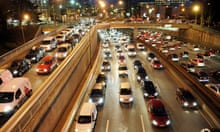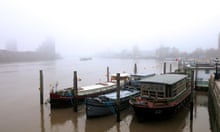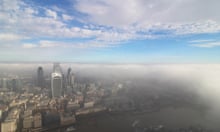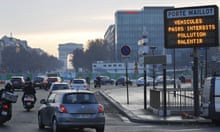The mayor of Paris, Anne Hidalgo, has unveiled plans to restrict traffic in the French capital and pedestrianise the city centre in an attempt to halve the number of private cars on the roads.
The move comes as arguments continue over the closure of roads along the Seine last summer and other traffic reduction measures introduced after dangerous spikes in pollution led to a cloud of smog over the city.
Hidalgo told the Journal du Dimanche she wanted to “divide by around half the number of polluting private cars” in Paris as part of her ongoing campaign to “reconquer the public space” for pedestrians, cyclists and other non-polluting transport, including electric cars and scooters.
A 1km stretch of road along the river from Place de la Concorde and Pont Royal is scheduled for closure.
City authorities also plan to restrict traffic on two main roads running from east to west: the upper highway on the right bank and the rue de Rivoli, on which City Hall is located.
Hidalgo is planning a new electric tramway, increased bicycle lanes on busy roads and the pedestrianisation of central areas.
She said urgent environmental concerns and the challenge of making the transition to clean transport were absolute priorities.
“The deluge is imminent and we cannot wait for it to sweep us all away … there are too many cars in Paris,” she told those gathered for her traditional new year wishes on Friday.
The mayor said from September 2018, an electric tram-bus – nicknamed the “Olympic tramway” in honour of Paris’s bid for the 2024 Games – would run next to part of the upper highways along the Seine in both directions.
The news will spark anger and dismay among Paris’s motorists, and Hidalgo’s political critics, who are already furious over the river highway closures.
In the summer, two miles (3.3km) of highway from the Tuileries in the 1st arrondissement and the Arsenal port near Bastille in the 4th arrondissement along the right bank of the Seine were closed to traffic. The highway on the left bank had been closed previously.
Drivers’ organisations were furious and complained that lengthy traffic jams caused by the closure were increasing pollution. The police have said the roads will be reopened if there are long-term problems, but City Hall insists they will remain closed.
Hidalgo said she was “acting for future generations” and would not be diverted by critics’ attacks. In December, Paris banned half of all cars for several days and offered free public transport as pollution choked the city.
Hidalgo said: “The pedestrianisation of the city centre is starting … the idea is to go step by step towards the pedestrianisation of the city centre. It will remain open to vehicles belonging to local residents, the police, emergency services and for deliveries, but not to all comers.
“We say clearly that our aim is the significant reduction in car traffic, as all the world’s large cities are doing. We must constantly remind people: the fewer cars there are, the less pollution there is.”









Comments (…)
Sign in or create your Guardian account to join the discussion